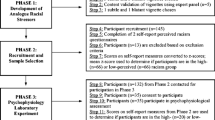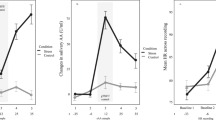Abstract
The Cook and Medley Hostility (Ho) Scale has been found to predict the development of coronary heart disease, coronary death, and death from other causes. Enhanced physiological responsiveness among high-Ho subjects may represent a link between hostility and health. The present study examined the systolic and diastolic blood-pressure (SBP, DBP) and heart-rate (HR) responses of high- and low-Ho undergraduate males while they presented their position and listened to their partner's opposing position in a current events discussion task. Compared to low-Ho subjects, the high-Ho group displayed larger SBP and DBP responses. These results and others suggest that cynical hostility is associated with greater physiological responses to interpersonal stressors.
Similar content being viewed by others
References
Barefoot, J. C., Dahlstrom, W. G., and Williams, R. B., Jr. (1983). Hostility, CHD incidence, and total mortality: A 25-year follow-up study of 255 physicians.Psychosom. Med. 45: 59–63.
Barefoot, J. C., Siegler, I. C., Nowlin, J. B., Peterson, B., Haney, T. L., and Williams, R. B., Jr. (1987a). Suspiciousness, health, and mortality: A follow-up study of 500 older adults.Psychosom. Med. 49: 450–457.
Barefoot, J. C., Williams, R. B., Jr., Dahlstrom, W. G., and Dodge, K. A. (1987b). Predicting mortality from scores on the Cook-Medley Scale: A follow-up of 118 lawyers.Psychosom. Med. 49: 210.
Benjamin, L. (1967). Facts and artifacts in using analysis of covariance to “undo” the law of initial values.Psychophysiology 4: 187–206.
Bernhardson, C. S. (1975). Type I error rates when multiple comparison procedures follow a significantF test in ANOVA.Biometrics 31: 229–232.
Blumenthal, J. A., Barefoot, J., Burg, M. M., and Williams, R. B., Jr. (1987). Psychological correlates of hostility among patients undergoing coronary angiography.Br. J. Med. Psychol. 60: 349–355.
Colligan, R. C., and Offord, K. P. (1988). The risk use of the MMPI hostility scale in assessing risk for coronary heart disease.Psychosomatics 29: 188–196.
Cook, W. W., and Medley, D. M. (1954). Proposed hostility and pharisaic-virtue scales for the MMPI.J. Appl. Psychol. 38: 414–418.
Costa, P. T., Jr., Zonderman, A. B., McCrae, R. R., and Williams, R. B., Jr. (1986). Cynicism and paranoid alienation in the Cook and Medley Ho Scale.Psychosom. Med. 48: 283–285.
Dembroski, T. M., and Costa, P. T., Jr. (1987). Coronary-prone behavior: Components of the Type A pattern and hostility.J. Personal. 55: 211–235.
Hardy, J. D., and Smith, T. W. (1988). Cynical hostility and vulnerability to disease: Social support, life stress, and physiological response to conflict.Health Psychol. 7, 447–459.
Hearn, M. D., Murray, D. M., and Luepker, R. V. (1989). Hostility, coronary heart disease, and total mortality: A 33-year follow-up study of university students.J. Beh. Med. 12: 105–121.
Houston, B. D., and Kelley, K. E. (1988). Hostility in employed women: Relation to work and marital experiences, social support, stress, and anger expression.Personal. Soc. Psychol. Bull, (in press).
Krantz, D. S., and Manuck, S. B. (1984). Acute psychophysiologic reactivity and risk of cardiovascular disease: A review and methodological critique.Psychol. Bull. 96: 435–464.
Leon, G. R., Finn, S. E., Murray, D., and Bailey, J. M. (1988). The inability to predict cardiovascular disease from hostility scores or MMPI items related to Type A behavior.J. Consult. Clin. Psychol. 56: 597–600.
Matthews, K. A. (1988). CHD and Type A behaviors: Update on and alternative to the Booth-Kewley and Friedman quantitative review.Psychol. Bull. 104, 373–380.
McCranie, E. W., Watkin, L. O., Brandsma, J. M., and Sisson, B. D. (1986). Hostility, coronary heart disease (CHD) incidence, and total mortality: Lack of association in a 25-year follow-study of 478 physicians.J. Behav. Med. 9: 119–125.
Ostfeld, A. M., Lebovitis, B. Z., Shekelle, R. B., and Paul, O. (1964). A prospective study of the relationship between personality and coronary heart disease.J. Chron. Dis. 17: 266–276.
Sallis, J. F., Johnson, C. C., Trevorrow, T. R., Kaplan, R. M., and Hovell, M. F. (1987). The relationship between cynical hostility and blood pressure reactivity.J. Psychosom. Res. 31: 111–116.
Shekelle, R. B., Gale, M., Ostfeld, A. M., and Paul, O. (1983). Hostility, risk of coronary heart disease, and mortality.Psychosom. Med. 45: 109–114.
Smith, M. A., and Houston, B. K. (1987). Hostility, anger expression, cardiovascular responsivity, and social support.Biol. Psychol. 24: 39–48.
Smith, T. W., and Frohm, K. D. (1985). What's so unhealthy about hostility? Construct validity and psychosocial correlates of the Cook and Medley Ho Scale.Health Psychol. 4: 503–520.
Smith, T. W., and Pope, M. K. (1989). Cynical hostility as a health risk: Current status and future directions.J. Soc. Behav. Personal. (in press).
Smith, T. W., Sanders, J. D., and Alexander, J. F. (1988a). Cynical hostility in marital interactions. Paper presented at the American Psychological Association annual meeting, Atlanta.
Smith, T. W., Pope, M. K., Sanders, J. D., Allred, K. D., and O'Keeffe, J. L. (1988b). Cynical hostility at home and work: Psychosocial vulnerability across domains.J. Res. Personal. 22, 525–548.
Suarez, E., Williams, R. B., Jr., and McCrae, A. (1988). High Cook-Medley scores predict cardiovascular reactivity but only during harassment. Paper presented at the American Psychological Society annual meeting, Toronto.
Williams, R. B., Jr. (1987). Psychological factors in coronary artery disease: Epidemiological evidence.Circultation 76 (Suppl. I): 1117–1123.
Williams, R. B., Jr., Haney, T. L., Lee, K. L., Kong, Y. H., Blumental, J. A., and Whalen, R. F. (1980). Type A behavior, hostility, and coronary atherosclerosis.Psychosom. Med. 42: 539–549.
Williams, R. B., Jr., Barefoot, J. C., and Shekelle, R. B. (1985). The health consequences of hostility. In Chesney, M. A., and Rosenman, R. H. (eds.),Anger and Hostility in Cardiovascular and Behavioral Disroders, Hemisphere, New York.
Weidner, G., Sexton, G., McLellan, R., Connor, S. L., and Matarazzo, J. D. (1987). The role of Type A behavior and hostility in an evaluation of plasma lipids in adult women and men.Psychosom. Med. 49: 136–145.
Weidner, G., Friend, R., Ficarrotto, T. J., and Mendell, N. R. (1989). Hostility and cardiovascular reactivity to stress in women and men.Psychosom. Med. 51: 36–45.
Author information
Authors and Affiliations
Rights and permissions
About this article
Cite this article
Smith, T.W., Allred, K.D. Blood-pressure responses during social interaction in high- and low-cynically hostile males. J Behav Med 12, 135–143 (1989). https://doi.org/10.1007/BF00846547
Accepted:
Issue Date:
DOI: https://doi.org/10.1007/BF00846547




